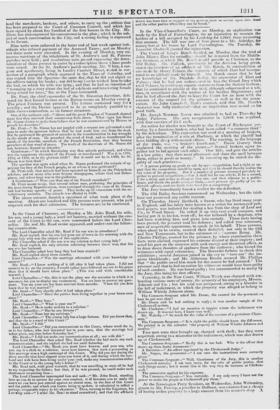In the Court of Chancery, on Monday, a Mr. John
Read, his wife, his son, and a young lady, a ward in Chancery, married without the con- sent of the Court to the son, were summoned before the Lord Chan- cellor. Mr. and Mr. Read senior appeared, and underwent the follow- ing examination.
The Lord Chancellor asked Mr. Read if his son was in attendance?
Mr. Read replied, that his son had gone out of town in the morning with the young lady who was the subject of this application. The Chancellor asked if the son was any relation to that young lady?
Mr. Read replied, the only relation subsisting between them was, that his son was her husband.
The Chancellor asked how long they had been married ?
Mr. Read replied about three months. Lord Chancellor—" Was the marriage solemnized with your knowledge or consent ?"
Mr. Read—" I knew nothing of it till after it had taken place. I did not consent to it ; on the contrary, I would rather have followed my son to his grave than that it should have taken place." (This was said with considerable warmth.) Lord Chancellor—" Sir, this is not the place nor the occasion in which it is necessary for you to display any excitement. You are here to answer my ques- tions. You say your son has been married three months. When did you first learn that he was married ? "
Mr. Read—" Very shortly after it had taken place."
Lord Chancellor—" Have the parties been living together in your house ever since? "
Mr. Read—" They have."
Lord Chancellor—" What is your son?"
Mr. Read—" He is under articles to a solicitor."
Lord Chancellor—" Has he any fortune ?" Mr. Read—" None but my earnings."
Lord Chancellor—" The young lady has a large fortune. Did you know that, and that she is award of this Court ?"
Mr. Read—" I did."
Lord Chancellor—" Did you communicate to this Court, whose ward she is, i or to her father, who had intrusted her to your care, that the marriage had taken place, any time before Saturday last." Mr. Read—" I did not make any communication at all ; my wife did." The Lord Chancellor then asked Mrs. Read whether she had made any such communication ; and she replied she had not until Saturday. Lord Chancellor—" Mr. Read, you must have known, and your son, who you say is a clerk to a solicitor, must have known, that such a proceeding as this marriage was a high contempt of this Court. Why did you not during the three mouths that have elapsed since you knew of it, and during which the hus- band and wife have been living under your roof, make any communication either to the Court or to the young lady's father ?" Mr. Read said, with great warmth, that he was unwilling to state all had to say respecting the father; but that, if he was pressed, he could make such disclosures respecting him— The Lord Chancellor interrupted him and said—." Mr. John Read, standing here as you do to answer for your own conduct, it ill becomes you to make the assert you have just uttered against an absent man, in the face of this Court and the public, and which you know, being so spoken, is calculated to inflict a perhaps irreparable injury to his character." Then, turning to the Registrar, his .Loreihip said—" I order Mr. Rea 1 to stand 'committed; and that the affidavit
which has been bled in support of the petition span ire server upon airs. Read and the other parties whea they can be found."














 Previous page
Previous page